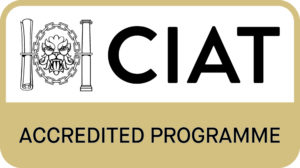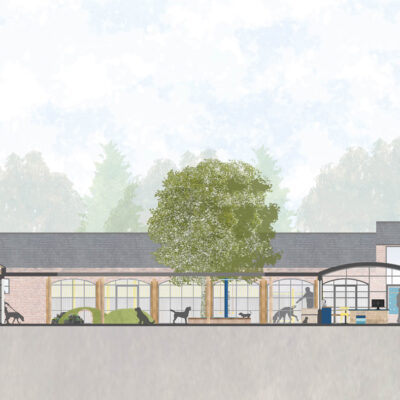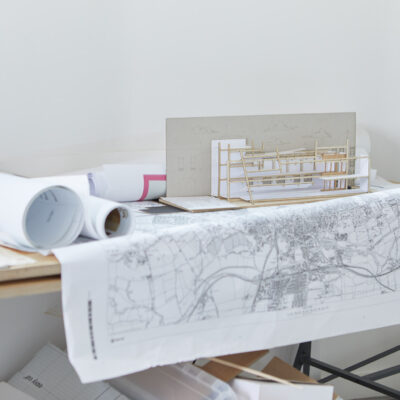Senior Lecturer in Architectural Technology
Faculty of Arts, Science and Technology

Architectural Technology BSc (Hons)
- Home
- Courses by subject
- Architectural Technology BSc (Hons)
Key Facts
-
UCAS Code
BSc: K210
BSc with Foundation: K211 -
Level
UndergraduateUG BSc (Hons)
-
Duration
Full Time: 3 years
Full Time Foundation: 4 years
Part Time: 4 - 6 years -
Starting
September
-
BCC at A-Level or,
DMM at BTEC -
Full Time: £9,535
Part Time: £1,585 per 20 credit module
Integrated Foundation Year: £9,535 -
Full Time: £15,700
Integrated Foundation Year: £15,700 -
Waterside
Updated 28/03/2025
Updated 28/03/2025
Get in touch
For questions regarding study and admissions please contact us:
UK STUDENTS ENQUIRIES
study@northampton.ac.uk
0300 303 2772
INTERNATIONAL STUDENTS ENQUIRIES
Please note that BSc (Hons) Architectural Technology has closed recruitment for 2025. You may wish to considered one of the following programmes instead:
The Architectural Technology degree at UON brings together project management, design and technical skills. During our Architectural Technology course, you’ll become prepared to deliver projects all the way from concept stage. You’ll learn and increase your knowledge of the industry and legislation, experience realistic projects and develop your creative skills.
This Architectural Technology course is accredited by the Chartered Institute of Architectural Technologists (CIAT), meaning you will be eligible for CIAT student membership and will be exempt from some modules that are required in the Professional and Occupational Performance record. Many of our graduates gain professional recognition from CIAT after they graduate, by pursuing the various stages of professional recognition.
Highlights
- Our Architectural Technology BSc (Hons) course is accredited by the Chartered Institute of Architectural Technologists (CIAT).
- Course lecturers run their own architectural practices giving up-to-the-moment teaching and professional guidance, including Chartered Royal Institute of British Architects (RIBA).
- Students studying for an Architectural Technology degree benefit from our strong links with architectural practices.
- Opportunities for placements.
- Access to a design studio and computer suite studio with current computer aided design (CAD) technology
- Enjoy exhibitions, events and visits during your course.
Entry Requirements
A typical offer for our Architectural Technology course is:
- BCC at A-Level or,
- DMM at BTEC/Cambridge Technical or,
- Pass (C and above) at T Level
-
You will be expected to have achieved GCSE English and Mathematics (or equivalent) at grade C/4 or above.
We welcome international applicants and encourage applications from those with a range of non-traditional educational or professional qualifications, as well as applications from students with a mix of A levels and BTEC/Cambridge Technical qualifications.
-
Admission to this foundation programme is:
- DEE at A-Level or,
- MPP at BTEC or
- Pass (D or E) at T Level
However, we would also like to hear from you if you have professional or industry experience instead, a range of other qualifications or self-developed subject knowledge that relates to the programme you wish to study.
-
Once your application has been reviewed, you may be invited to attend an interview with us.
Prior to your interview you will be asked to send in a digital portfolio of some of your work. The content of the portfolio can either be scanned manual drawings or digital drawings (or a combination of both manual and digital) of buildings, objects, landscapes etc. We’d also like to see any photographs if you have them.
Your interview will be with a member of the programme team and you’ll go over your portfolio with them. They’ll ask you some questions around your work and your interest in the course. This is also a great opportunity for you to ask them any questions you may have about the course.
We hold our Architectural Technology interviews online and it will take around 30 minutes.
-
All International and EU students applying for a course with us must meet the following minimum English language requirements:
- IELTS 6.0 (or equivalent) with a minimum of 5.5 in all bands
for study at undergraduate level
For information regarding English language requirements at the University, please see our IELTS page.
- IELTS 6.0 (or equivalent) with a minimum of 5.5 in all bands
Upcoming Discovery Days
Discovery Days give you the best experience and insight to courses, people and facilities that interest you. Make your choice easier and come meet us.
Course Content
-
Our BSc Architectural Technology course has been accredited by the Chartered Institute of Architectural Technologists (CIAT) and has also been recently redeveloped to align with the newest QAA Subject Benchmark Statement for Architectural Technology.
Our curriculum has three key themes: Presentation, Technology, and Professional Practice and Design, each one being taught over the three years of your time studying Architectural Technology at university, covering various subjects with complexity and depth.
You’ll have the chance to meet and work with local and national industry experts through project briefings, reviews, tutorials and presentations, learning the theory and practical applications of skills and creating a professional network with potential recruiters. Plus, you’ll visit construction sites across the UK and internationally, to see projects at various stages. There are opportunities to work on real-life projects, participate in national competitions and exhibitions, and be recognised in our annual degree show.
Typical design projects involve site visits, primary technical and contextual research, concept sketching, 2D and 3D computer-aided design, physical model making and presenting to client design teams. You will be taught manual drafting and software such as: Adobe Photoshop, Adobe Illustrator, Adobe Premiere Pro, AutoCad, Revit, 3DstudioMax, Navisworks, ArchiCad etc.
Please note the modules shown here relate to the academic year 24/25. The modules relating to the academic year 25/26 will be available from June 2025.
-
-
Visual and Technical Communication (40 Credits)
Module code: 3DD1057Status: CompulsoryComprehending the relationship, validity and application of manual, analogue and digital communication skills are essential for an architectural technologist. Materials, scale/volume, texture/elements, objects and their properties are taught within the context of the theory of the built-environment. Sketching, model-making, drawing, visual/verbal presentation methods are developed. Digital skills are introduced using industry-specific software.
-
The Architectural Technologist (20 Credits)
Module code: 3DD1058Status: CompulsoryThis module focuses on the evolution of Architectural Technology using contemporary and historic precedents to illustrate this journey. The roles of client, designer and constructor are reviewed in context. Following the British Standards, surveying standards, sustainability codes, and theories of Architecture and Built environment, the students will progress with their case studies.
-
Principles of Technical Design in Architecture (40 Credits)
Module code: 3DD1059Status: CompulsoryThis module introduces students to the basic principles, concepts and vocabulary of architectural technology. It enables students to understand the scientific principles underlying the stability of a building and the control of the environment and to undertake basic design calculations referring to British standards.
-
Architectural Design (20 Credits)
Module code: 3DD1060Status: CompulsoryThis introductory module to Architectural design will introduce the principles of architectural design and ideation. Students will learn how to gather information necessary for designing a building; information on the function of a project, its occupiers and other stakeholders, the surroundings, spatial requirements of the building.
-
Visual and Technical Communication (40 Credits)
-
-
Building Information Modelling (20 Credits)
Module code: 3DD2066Status: CompulsoryBuilding on the computer skills gained at Level 4, this module revolves around the current industry software and practical information and performance management requirements. The module focuses on these requirements to develop critical skills required in BIM modelling and building performance analysis.
-
Practice, Regulations and Conventions in Architecture (20 Credits)
Module code: 3DD2067Status: CompulsoryThis module develops a practical knowledge of core legal, regulatory and business requirements for securing approval, development and implementation of built environment proposals. This module covers the understanding of the benefits and application of design codes, planning law, planning frameworks, quality and sustainability standards, the Building Regulations and Party Wall.
-
Design Specification and Production Information (40 Credits)
Module code: 3DD2068Status: CompulsoryThe selection of materials and components is critical to the success of an architectural proposal. In this module students learn to conduct in-depth industry focused investigations into the application of appropriate materials and/or components in collaboration with industry partners and to develop detailed design drawings associated with the specification.
-
Technical Architectural Design 1 (20 Credits)
Module code: 3DD2080Status: CompulsoryThe purpose of this module is to develop learners? ability to analyse and interprete given briefs as well as develop architectural design up to the developed design stage in line with the industry standard practices. This is achieved through `live? project brief and precedent studies on small scale residential, commercial, institutional or mix-use project.
-
Technical Architectural Design 2 (20 Credits)
Module code: 3DD2081Status: CompulsoryThe purpose of this module is to develop learners? skills to produce technical architectural drawings and detailing from developed architectural design schemes for residential, commercial, institutional or mix-use buildings. This is achieved through critical analysis and evaluation of a development architectural design scheme and application of established working practice, concepts, principles and relevant regulations.
-
Building Information Modelling (20 Credits)
-
-
Modelling, Simulation and Visualisation (20 Credits)
Module code: 3DD3039Status: CompulsoryThe module enables students to develop their IT skills to an advanced level. The module focuses on enhancing BIM, building performance analysis, animation, and 3D modelling and visualisation quality, data intensity and end value. Students will learn to use models for intensive analysis and evaluation.
-
Project Management in Architecture 1 (20 Credits)
Module code: 3DD3048Status: CompulsoryThis module develops critical thinking that will enable students to reflect upon best practice in the leadership and management of an architectural design project. Students will be required to justify project management and presentation judgments about the validity of ideas within a prescribed scenario.
-
Project Management in Architecture 2 (20 Credits)
Module code: 3DD3049Status: CompulsoryThis module develops critical thinking that will enable students to reflect upon best practice in the leadership and management of an building construction project. Students will be required to justify construction project management and presentation skills within a prescribed scenario.
-
Research and Project Design for Architectural Technologists (20 Credits)
Module code: 3DD3050Status: CompulsoryThe purpose of this module is to further develops students? theoretical, analytical, critical and practical skills to devise effective methods of analysis briefs, designing, evaluating, problem-solving, organizing and managing comprehensive architectural design and access statement to a professional standard. This is achieved via completion and presentation of analysis of a given brief, technical report, production of architectural design up to the developed design stage and presentation of the design proposal.
-
Final Major Project (40 Credits)
Module code: 3DD4019Status: CompulsoryThe purpose of this module is to give the students the opportunity to prove their theoretical, analytical, critical and practical skills to devise effective methods of production of highly-technical project from a developed architectural design scheme up to the technical design stage. This is achieved via completion and presentation of a technical report, architectural and technical designs, detailing, specifications and presentation of a project.
-
Modelling, Simulation and Visualisation (20 Credits)
-
-

The course has been accredited by the Chartered Institute of Architectural Technologists (CIAT) and has also been recently redeveloped to align with the newest QAA Subject Benchmark Statement for Architectural Technology.
-
At the University of Northampton, everything we do, from funded trips to paid internships, is to give you everything you need to make a difference when you leave.
If you join this full time architectural technology degree at Northampton, you will receive a laptop when your course begins*. The laptops are built to a bespoke custom specification ideal for use in the seminar room, collaborative group work or studying at home.
Whatever your ambitions, we’re here to help you to achieve them. We’ll support you to identify the skills you’re learning during your course, find your strengths and secure practical experience so that when it comes to applying for jobs or further study you’ll feel confident in standing out from the crowd. We’ve created the Northampton Employment Promise because we are so confident that if you focus on your studies and complete one of our awards you’ll be highly employable by the time you graduate. Putting you in a great position to secure employment or continue your studies.
To check out the full list of perks, visit our Student Perks page or dedicated International Perks page.
*UK fee payers only (see Terms and Conditions for further details).
-
The Integrated Foundation Year (IFY) offers a new and exciting route into studying for a degree, attracting ambitious and driven students who are willing to learn and advance.
If you have non-standard qualifications or do not quite meet the admissions requirements we can offer you a fantastic opportunity to study a four year programme which includes an Integrated Foundation Year. The Integrated Foundation Year will help you develop the theoretical/practical and academic skills you need, in order to successfully progress to the full award.
Our four-year courses will enable you to successfully follow the degree pathway of your choice while gaining essential study skills. The foundation year of your chosen degree will be studied on a full-time basis and is aimed at supporting the transition to higher education. Years two, three and four are then studied as a standard degree programme.
-
What is Architectural Technology?
Architectural technology is an architectural discipline focused on building engineering. It refers to the technical expertise and insights which are vital to creating efficient building designs that meet various production and performance criteria.
Architectural technician courses focus on building design and explore the processes of conception, development, detailing, sustainability, contract administration, and construction technology.
What can you do with an Architectural Technology degree?
With an Architectural Technology degree, you can pursue a role as a chartered architectural technologist (MCIAT), with employment opportunities available from local authorities, housing corporations and property developers, building and construction firms, architecture practices, and academic and research institutions, amongst others.
Architecture technology degrees teach crucial technical, visual and planning skills which can be applied in various architectural positions, including architect, CAD technician, building control surveyor, interior and spatial designer, urban designer, building surveyor, and fire risk assessor.
How will this programme be taught?
Our BSc Architectural Technology degree is typically run over three years with an optional part-time study route. You will have two or three days per week of lectures, tutorials, studio work, meetings with industry partners and one-to-one project consultations. These are complemented with extra-curricular activities run by the course, student societies, student union and CIAT AspirATion group.
How will I be assessed?
You will be assessed continuously through project work, assignments or reports. This will assess your theoretical and practical skills.
Worried about student finance?
Get all the info you need ahead of time, before you can apply for funding in Spring on our fees and funding pages.
Fees and Funding
2025/26 Tuition Fees
- UK – Full Time: £9,535
- UK – Part Time: £1,585 per 20 credit module
- UK – Integrated Foundation Year: £9,535
- International – Full-time: £15,700
- International – Integrated Foundation Year: £15,700
Fees quoted relate to study in the Academic Year 2025/26 only and may be subject to inflationary increases in future years. UON will adjust UK fees annually in line with Government Policy.
-
- Exhibitions: £200 (Various throughout year – also covers costs of taking part in exhibitions).
-
For information on the scholarships available to you, please see our scholarships page.
For more information about possible funding options, please visit our Fees and Funding pages.
-
Fees quoted relate to study in the Academic Year 24/25 only and may be subject to inflationary increases in future years.
- UK – Full Time: £9,250
- UK – Part Time: £1,540 per 20 credit module
- UK – Integrated Foundation Year: £9,250
- International – Full-time: £15,200
- International – Integrated Foundation Year: £15,200
Staff

Senior Lecturer in Architectural Technology
Faculty of Arts, Science and Technology
Theophilus Shittu

Senior Lecturer in Architectural Technology
Faculty of Arts, Science and Technology
Theophilus Shittu
Careers and Employability
As a discipline, Architectural Technology aims to equip you with the skills for exciting and challenging careers in design offices, construction sites, local and central government or housing associations etc. We are proud of our graduate employment rates, driven by the close alignment with industry, industry knowledge and research. Several of our lecturers run their own architectural practices and give you relevant teaching and professional guidance.
Many UON Architectural Technology BSc graduates also continue their studies on master’s courses.

Related Courses

Interior Architecture & Spatial Design BA (Hons)
The Interior Architecture and Spatial Design programme is focused on developing professional and design skills.

Product Design BA (Hons)
We challenge ideas of functionality, aesthetics, materials, sustainability, social contexts and ethics so you can design...

BIM-Enabled Sustainable Buildings MSc
A BIM-Enabled Sustainable Buildings MSc gives graduates interested in environmentally responsible buildings the knowledge and skills...

Architectural Technology (Top-Up) BSc (Hons)
Build upon project management, design and technical skills and develop knowledge of the industry and legislation,...
